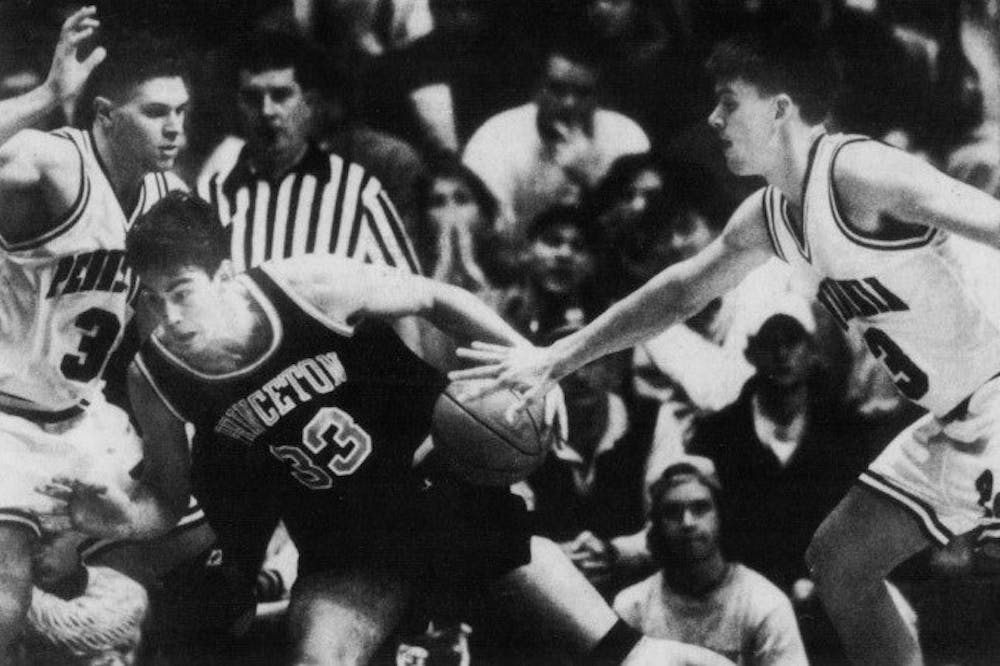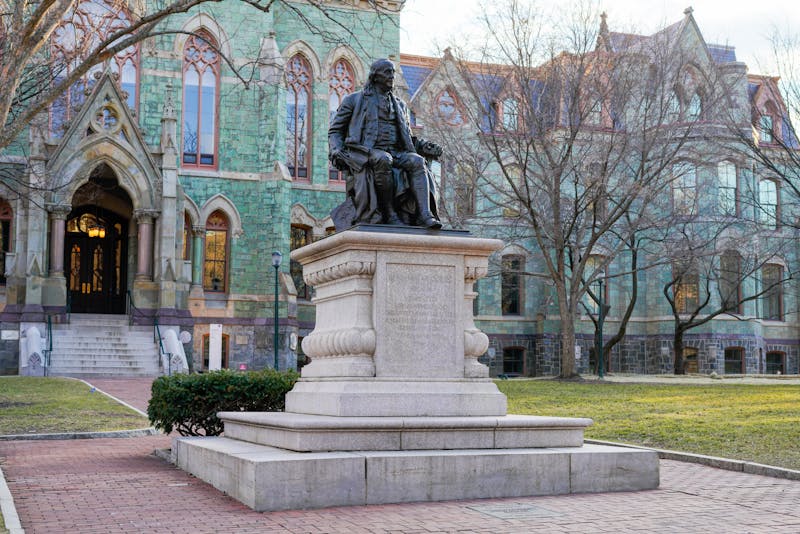
Penn men's basketball was NCAA Tournament-bound in 1994 after going undefeated in the conference for the second straight season.
The Quakers imposed themselves on the Ivy League with a 14-0 record. The victory against Princeton, which secured an automatic berth in March Madness, was Penn’s 27th consecutive conference win over three years. It wasn’t easy for the Quakers however, as they had to work on their inside game and face tough opponents throughout the season.
The 1994 team was led by senior forward Barry Pierce and junior guards Jerome Allen and Matt Maloney, who all averaged nearly 15 points a game. The season began with a 9-2 record, and those two losses ended up being the only ones on the year. Their success came as the Red and Blue showed an ability to bounce back from uncharacteristic losses with their talented lineup.
One of these losses was against Temple, 76-55, which brought criticism to the team and questioned if they could compete with a top-25 opponent.
“This was a very important game for all of us,” Penn coach Fran Dunphy said. “We wanted to show our best out there and up until about the five-minute mark, I thought we did. There’s probably a couple first-round [NBA] draft picks out there that we played against … but I thought we could have played much better.”
Pierce, Allen, and Maloney were always a tough matchup in the conference, but outside of it, forward Shawn Trice and center Eric Moore had to contribute. In the loss against the Owls, Trice shot 22% from the field for three points. He averaged 22.5 points, seven rebounds and 85% shooting in a Seattle tournament just before. Moore had averaged 10 points a game and was a force in the paint but shot 0-for-1 against Temple.
“We have to work on our inside game,” Dunphy said after the game. “We need to be dominant in the paint and we need consistency from our role players.”
In a blowout victory against Princeton 77-52, the Quakers bounced back with a revamped inside game and great performances from Trice and Moore. Penn had averaged 29 threes a game but Princeton’s game plan to slow the Quakers down wasn’t effective.
“It’s always a thought of ours to try to work from the inside out, but we do what the defense dictates,” Dunphy said. “In the first half, they weren’t allowing us to get any threes off and we were fairly successful inside.”
Allen and Maloney, the “best backcourt in the Ivy League” as per Princeton coach Pete Carril, only combined from 23 points, where 12 came from free throws. The frontcourt stepped up when it mattered most. Trice had 21 points and 8 assists and Moore had 17 with 11 rebounds.
“We held Allen and Maloney in check but some others got out of the bag,” said Carril. “We let them get out of control.”
The Red and Blue rode this momentum to win games like the “Buffalo Massacre” where the Quakers pummeled the Buffalo Bulls, 77-52. Once again, Penn was led by scoring leaders Trice, with 14 points and a career-high 12 rebounds, and Moore with 13 points and 5-of-6 shooting.
“Our offense shifts to a higher gear when the second-stringers and bench play their hearts out like they did tonight,” Dunphy said.
From this point on, the Quakers were nearly unstoppable. In the next meeting with Princeton, Penn came out victorious, 66-55. The Red and Blue dominated the first half, relying on their inside attack yet again. High-percentage shots embarrassed the Tigers, who combined for 23% from the field.
“It’s just a matter of milking the cow,” said Allen, who tallied 11 points, five rebounds, and four assists. “Whatever is going for you, you keep tapping it. I’m just glad that on this team, someone always steps up and makes some shots.”
Penn’s defense was arguably the team's greatest strength. Limiting Princeton to 23% shooting was due in large part to the Quaker’s tough zone and rotations.
“I think we’re a good defensive team, and I think this was as good as we have played defensively all year,” Dunphy said in the postgame presser.
The 1994 team had exceeded expectations, but Dunphy wanted to temper them, especially before clinching the Ivy League title.
“I would like people to measure us after the season’s over and see how successful our season was,” Dunphy said. “We are playing pretty well, but I don’t think we’ve played our best game yet. I wanted our kids to show me that tonight, and I think for the most part they did.”
Penn secured a berth to the NCAA Tournament in a game that was a bitter struggle to the end.
In the final meeting with Princeton, the Tigers held the Quakers to an abysmal 32.8% shooting and Ivy League player of the year, Jerome Allen, to 12 points. Princeton committed 21 turnovers but Rick Hielscher’s 21 points kept them in the game.
Maloney, the 6-foot-3 junior guard who transferred from Vanderbilt three years ago, created a driving layup with 3:46 left to put the Quakers up, 46-43. Penn then held Princeton without a point for five minutes and Maloney went on a nine-point scoring spree to end the game, 66-55.
"I felt confident going in," said Maloney, who finished with a game-high 24 points. "I think down the stretch it was a little too close and the defense really stepped up. It's a great feeling."
“It’s fun for me,” Dunphy said. “This is what Penn basketball is about, to come up here and play Princeton with the history and tradition they have. It’s definitely a big win. Last year it was sort of a turning point, and this year we sort of wanted to take the same importance into this game. I think we came out of it with that and we’ll go onto the tournament with it.”
Penn went on to beat Nebraska in the first round, but lost to Florida in the second. The 70-58 loss was a disappointing one, an ice-cold shooting night from Maloney, Allen, and Trice. The Gators constantly switched their defenses to limit the best backcourt in the Ivy League to 30.8% from the field.
“I give them some of the credit, but I think that a lot of [the blame] lies on ourselves,” Allen said. “We didn’t do too good of a job executing our cuts and other things.”
The second round exit was due to an over-reliance on three-point shots. Penn lived by the three before but died by the three against Florida.
“We played, I thought fairly well,” Dunphy said. “We just didn’t shoot the ball. We had a number of good looks, but the ball just didn’t go in the hoop. The shots that fell on Thursday just didn’t fall tonight.”
The Red and Blue’s season did not end how the Quakers had hoped, but 1994 will live on as one of Penn’s most dominant years.
The Daily Pennsylvanian is an independent, student-run newspaper. Please consider making a donation to support the coverage that shapes the University. Your generosity ensures a future of strong journalism at Penn.
Donate






